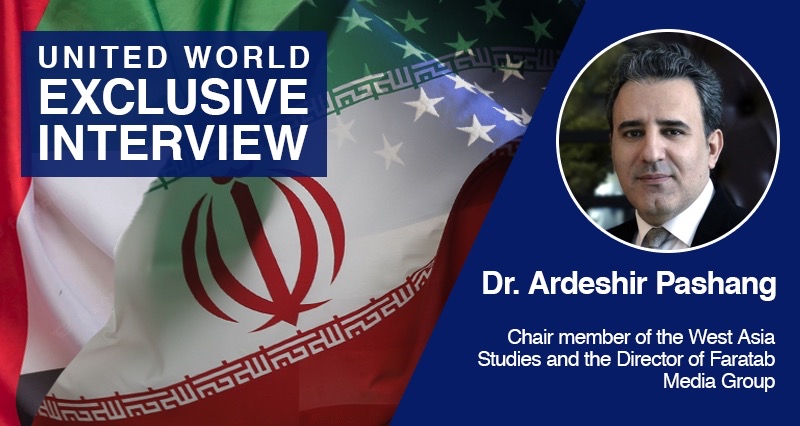By Golnar Hakimi / Tehran
Iranian Middle East expert, Dr. Ardeshir Pashang, who is also a chair member of the West Asia Studies and the Director of Faratab Media Group, has evaluated the UAE-Iran relations and the American decision to sanction the UAE over its recent relations with Iran, in an interview with United World International.
Recently, there have been rumors by the foreign media outlets that the US may impose sanctions on some Emirati companies due to its trade relations with Iran (by playing a middleman role for exporting the Iranian oil). Although the purpose of the US in taking such actions is to put an indirect political pressure on Iran, would you think that there might be another reason for Washington’s such decision?
I would first like to draw a realistic profile over the Tehran-Abu Dhabi relations. The relationship between the Islamic Republic of Iran and the United Arab Emirates (the UAE) is a very complex and a multidimensional relationship. As it is already known, the factors that rely on revolutionary ideas in Iran and the occupation of the US Embassy in Tehran by the students who follow Khomeini’s ideals within the framework of an anti-Western ideology, has led to the isolation of Iran in the international arena. The consequent, years-long war with Iraq, has also made the country’s economic situation even more fragile. This was a golden opportunity for the UAE to become the main trade and transit hub in the Persian Gulf and also to be an important financial gate for the Iranian investments. In this case, Iran has made Dubai its window of establishing relations with the outside world. As a result, several thousand Iranian companies were registered and has begun operating within Dubai. Therefore, an informal but a solid bond was mutually formed between the parties.
On the other hand, we also know that there are various historical and regional tensions between Iran and the UAE; the most important being the Emirates’ claim over the islands of Greater and Lesser Tunb and the island of Abu Musa. We also witnessed serious escalations in tensions between Iran and Saudi Arabia since Mahmoud Ahmadinejad’s presidency back in 2005. The developments in Yemen and Iranian stance against Saudi Arabia in this country have also caused the UAE to shift closer to Saudi Arabia by each day. So, we’ve seen missiles for the first time being fired and strikes made over UAE territory or ships, by the Houthis (an ally to Iran).
I have told all these to emphasize that the relations between the two sides are very complex, and there are some serious collaborations on one hand and rivalries on the other. In addition, the two countries do not want to increase the level of tensions for many different reasons. Therefore, it is natural that the UAE, in the form of some well-known companies, would help Iran to export oil, both for mutual benefit and to reduce tensions with Yemen and etc. And this is the reason why the US is also putting a political pressure on the UAE.
We have seen in June that the US has imposed sanctions on some Emirati companies because of their trade relations with Iranian petrochemical companies. Well, the question is about this matter; Iran is now in talks with Saudi Arabia to normalize its relations. If these negotiations are concluded in a positive way, do you think there could be a possibility of imposing sanctions on Saudi Arabia as well?
I think it is more important whether Iran will finally reach an understanding with the United States on the revival of the nuclear deal, rather than Iran’s regional relations with the UAE and Saudi Arabia. This is because there have been both positive and negative signs from Iran regarding the nuclear deal. And as a result, the US is trying to increase its pressure on Tehran in various ways, in order to force it to revive the deal.
We can come up with two scenarios: 1- If the nuclear deal is revived, the regional pressure of the United States on Iran will naturally decrease. 2- If the agreement fails, the US will naturally try to increase its pressure against Iran by using various means, creating an economic blockade that wound the region, and put double pressure on Abu Dhabi, Riyadh, even Baghdad or Muscat.
Can the UAE mediate between Saudi Arabia and Iran?
Currently, mediator countries such as Iraq and, to a lesser extent, Oman and Kuwait are trying to soften the political atmosphere between Iran and Saudi Arabia. The UAE’s role in this will not be very effective. But perhaps if tensions between Iran and Saudi Arabia decrease, the experiences of complicated relations between Iran and the UAE, could actually have a positive impact on future relations between Tehran and Riyadh.

















Leave a Reply